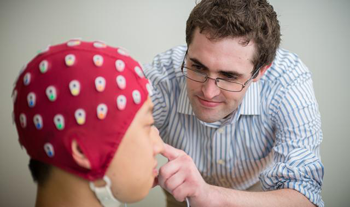Noticing mistakes boosts learning
Children who pay closer attention to mistakes improve skills more quickly, study shows

New research shows that kids who pay attention to their mistakes are likely to do better the next time.
bowdenimages/iStockphoto
Mistakes get a bad rap. People often brush them aside by saying, “I’ll do better next time.” But students who pay close attention to their mistakes actually do learn a task faster than kids who ignore them. Focusing on what went wrong helps us learn, a new study shows.
Hans Schroder is a psychologist at Michigan State University in East Lansing. He and his team wanted to know how people’s brains respond to mistakes. People can ignore a mistake by simply pretending it never happened. Or they can mull it over. They can try to figure out what went wrong and where. Schroder suspected that which response people chose might strongly affect how well they learned.
To find out, the team recruited 123 children, all six to eight years old. This is an important time in a child’s life. It is when most kids are beginning school. How well they do in school can be related to their mindset about learning and intelligence.
A mindset is a particular attitude about a situation. Students who have a “fixed” mindset tend to believe that they are born with a certain level of intelligence. They don’t believe it can ever change. Students with a “growth” mindset, however, think they can get smarter through hard work. Scientists have shown that this mindset can affect how well students learn.
To figure out whether each child had a fixed or a growth mindset, Schroder asked the recruits a series of questions. He then put a special cap on each child’s head. That cap held 64 small sensors called electrodes. The cap held these against the child’s scalp and recorded electrical signals as they sparked between the child’s brain cells. This let Schroder spy on patterns of activity inside each child’s brain.

While wearing the cap, children played a computer game. In it, they rounded up animals that had escaped from a zoo. Players had to press the space bar when they saw one of the escaped critters. But the game came with a twist. Three orangutans were also helping round up the animals. When players saw the orangutans, they were not supposed to press the space bar. The children could make two kinds of mistakes — either responding when they shouldn’t or not responding when they should. As they played, the electrodes recorded their brain’s activity.
When Schroder examined the data, he found a clear pattern. Small regions of the brain responded in the children who had a fixed mindset. Each response lasted just 150 milliseconds. The brains of children with a growth mindset showed much more activity. What’s more, a larger network of areas responded. And those areas did so for longer periods — up to 500 milliseconds. This shows that these brains were paying attention to mistakes, Schroder says.
Children with growth mindsets were also better at bouncing back after their mistakes. “They were more likely to get the next trial right,” Schroder says. “It was almost as if the children with growth mindsets were willing to engage with their mistakes in order to correct them.” In contrast, “those with fixed mindsets wanted to ignore their mistakes,” he says.
His team’s results appear in the April issue of Developmental Cognitive Neuroscience.
“This research demonstrates one way that a growth mindset helps you learn more,” says Allison Master. She is a psychologist at the University of Washington in Seattle. She was not involved with the study. “When you face your mistakes and are ready to learn from them,” she says. “Then you can get better over time. But if you run away from your mistakes and try to ignore them, you’ll never improve.”







